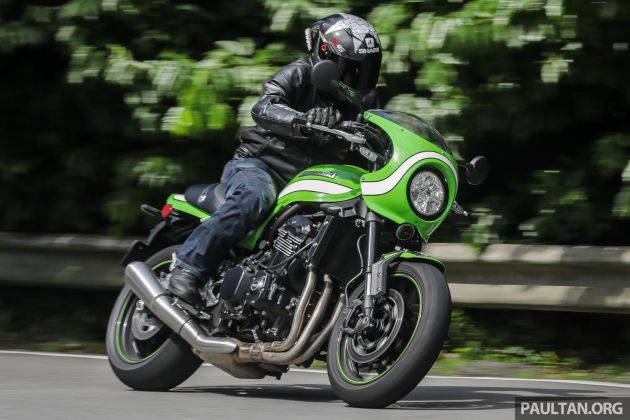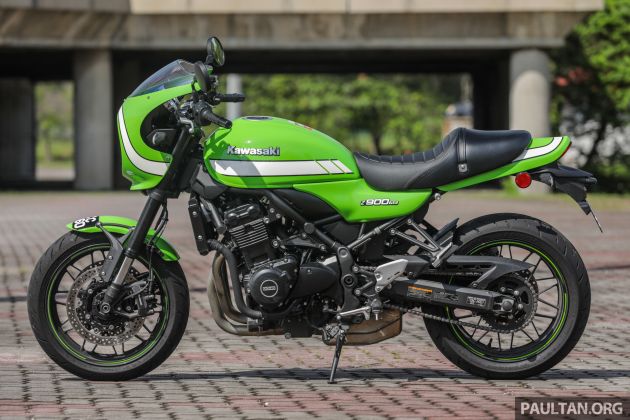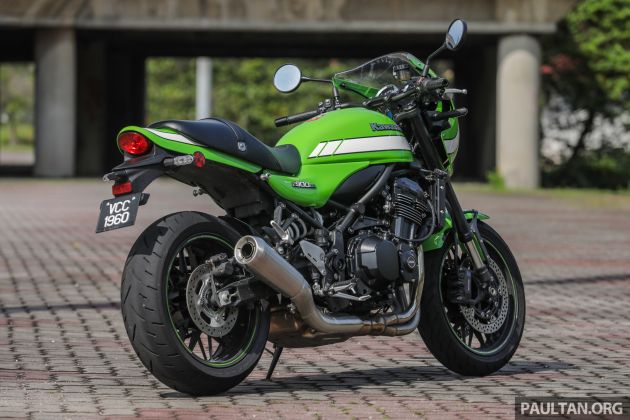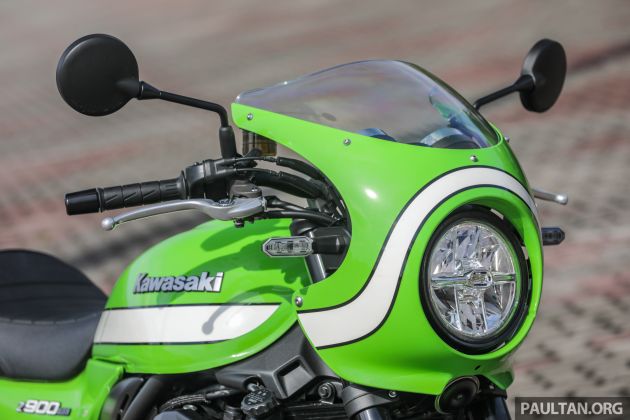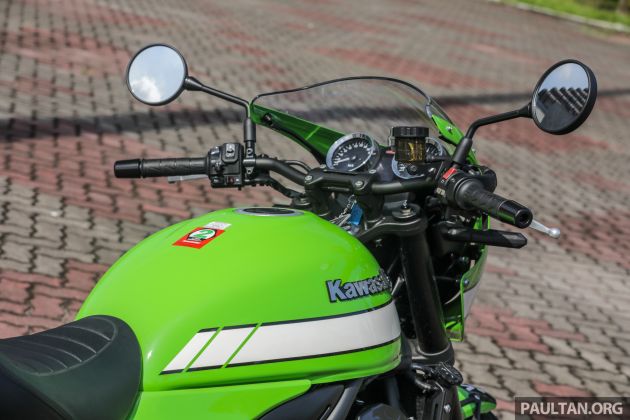Dressing mutton for lamb is a time honoured practice amongst vehicle manufacturers, but is the 2018 Kawasaki Z900RS Cafe at RM72,372 a prime example of this? It cannot be denied the current trend for motorcycle nostalgia is riding high and manufacturers are well aware of this – except maybe Harley-Davidson since everything they make is two-wheeled nostalgia anyway.
Coming back to the matter at hand, Kawasaki does have a reputation for building ferocious inline-fours going all the way back to the 1970s with the original Z-series bikes, followed by the KZ and GPz machines. With the advent of the liquid-cooled GPz900R – the original Ninja – Kawasaki has, in Malaysia at least, led the way with its street-oriented four-cylinder litre-class machines.
When the Kawasaki Z900 was launched a couple of years ago, we had a close look at the engine and frame and thought that particular combo would be a good basis for a modern bike in retro clothing. Someone in Kawasaki must have been listening because a year later, the Z900RS came out, looking like it had rolled out of a catalogue from the 70s.
You know the one, the glossy four-page catalogue you drooled over as a young teenager, waiting for the day you could own your first four-cylinder superbike. Then Kawasaki goes and ups the ante with the Z900RS Cafe, giving it that trademark lime green paint with white stripe and a bikini fairing to complete the look.
But, is the Z900RS Cafe worth the RM4,472 premium Kawasaki Malaysia is asking over the base Z900RS – RM2,472 difference from the SE edition? That’s what we intended to find out when Kawasaki handed us the keys to the Z900RS Cafe for review.
With its dress-up kit, the Z900RS does look the part of a late 70s sports machine, meant to go really fast and impress the ladies, or men, if you feel that way inclined. Dressing up sometimes means corners are cut, or it’s all looks and no go.
This is definitely not the case with the Z900RS Cafe, coming as it does with the 948 cc inline-four taken from the Z900, but tuned for more low- and mid-range torque – in this case, 111 PS at 8,500 rpm and 98.5 Nm at 6,500 rpm. This compares against the 125 PS at 9,500 rpm and 98.6 Nm of torque at 7,700 rpm of the Z900.
The Z900RS Cafe, like its naked retro sports sibling, the Z900RS, does come with a few surprises of its own though. First up is the fully-adjustable suspension in the upside-down forks, unlike the Z900’s rebound and preload adjustment-only forks.
However it’s all the same at the back end, where the Z900RS Cafe is fitted with a rebound and and preload adjustment monoshock, like the Z900. We can say at this point that we found a lot to like about the Z900RS Cafe’s handling, of which more anon.
Swinging a leg over the 820 mm-tall seat, the rider will notice the Z900RS Cafe comes with a pronounced hump in the pillion area, mimicking the cafe racer styling of five decades ago. In comparison to the notably flatter seat fitted to the Z900RS and the two-piece race-styled affair on the Z900, the Cafe fits a pillion passenger rather well despite some high speed nonsense involving only one wheel being in contact with the tarmac.
Starting up the Cafe brings the inline-four to life with a very pleasant rumble. According to Kawasaki, the exhaust note of the Z900RS Cafe has been tuned give the impression of a modded engine, and in this respect we can say they succeeded.
Revving up the engine for the sheer pleasure of it, listening to the exhaust note, was done as often as possible. Setting off on the Cafe, the assist and slipper clutch keeps lever effort on the light side of things.
Even when riding in heavy traffic, just a light pull on the clutch lever was enough to engage and disengage the six-speed gearbox. Shifting through the gears, we found the gear lever throw short and precise, with no false neutrals or missed shifts.
We rated the Cafe’s gearbox highly and indeed, the shifting quality was near race levels of precision. Riding the Z900RS Cafe around, the gearing was a good match for the engine’s performance, capitalising on the large amount of torque available.
In the mid-range, the pull from the engine was enough to induce a grin inside the author’s helmet, making highway overtaking and canyon strafing a breeze. Keep the Cafe in fourth or fifth gear and letting the bike do the work became our philosophy when the Cafe was in our hands, with sixth being used mainly on the highway as overdrive to drop engine revs.
Power delivery was very smooth and we liked the way the Z900RS Cafe built speed in a linear fashion with nothing to surprise the unwary rider. This is a bike for every level of rider, even newbies, as the engine is docile and tractable below 5,000 rpm.
Wind the throttle open above 7,000 rpm though, and the ferocity for which Kawasaki is famous comes to the fore. From 7,000 to the 10,000 rpm redline, the Z900RS Cafe would pull, and pull hard, hoisting the front wheel off the ground along the way.
Pushing the Cafe hard through the corners on the usual mountain ride, the bike did like being treated as a sports bike with late corner entry and steep dives for the apex. But dialling things back a notch, the Cafe was equally at home taking corners at a less frenetic pace, following the classic in-apex-out cornering line using a higher gear.
While we found handling to be fine, feedback from the standard fitment Dunlop tyres was a little vague when heeled over and we would strongly recommend a change to suitable soft rubber if you’re a hard rider. Make no mistake, despite its 216 kg curb weight, the Z900RS does like being hustled around the corners, though some riders might find steering effort a little heavy at the outset.
The rider will soon get used to this as we did.
Out on the highway, there was more than enough power and torque for the Z900RS to rapidly reach speeds well above what might be termed prudent. This is when we found the little bikini fairing is more than just window dressing.
Leaning forward in a moderate crouch, wind blast was diverted around the rider’s helmet and shoulders, with just enough force on the chest to take pressure off the wrists. Leaning a little further forward leaves the rider inside a still air bubble that takes the worst of the wind buffet away from tiring the rider.
Functional body work does indeed make a difference in this case, and made the Z900RS Cafe that much more enjoyable to ride compared to its naked Z900RS sibling. We did not get a chance to test the long distance comfort on the Cafe, but a medium length journey did not show any shortcomings in terms of rider butt comfort.
With seating in the traditional manner, and feet just slightly set to the back for a slightly sporty ride position, the Z900RS Cafe allows most riders to get comfortable in the saddle. Certainly we found the hand-seat-foot triangle relationship fit us like a glove and allowed the author to go fast on the Cafe from the get-go.
The Z900RS Cafe and the base model also get radial-mount brake callipers, compared to the axial-mount items on the Z900 naked sports. We found braking to be perfectly adequate for the nature of the the Z900RS as a retro-sports machine, needing only two fingers to bring the bike to a halt, letting the brake lever go just before ABS kicks in.
Feel and feedback from the brakes were good, and showed no signs of fade despite a spirited cornering session fully-loaded with pillion. Suspension performance was similarly good, though when pushed to the edge of the envelope, the rear end started weaving a little at extreme lean angles with the front end getting a little light and vague.
Keeping things at a reasonable level, the Z900RS Cafe did the job as advertised and will be entertaining enough for most riders except the very hardcore few, for which we might suggest something like the ZX-10RR. Equipped as it is with a modern mill and up-to-date riding conveniences such as LED lighting, the Z900RS Cafe ticks all the right boxes for a retro-style sports bike done right.
Inside the cockpit, a pair of analogue clocks bisected by a monochrome LCD panel displays everything the rider needs, though we did find ourselves reading the engine and road speed by the position of the needle rather than the numbers, just like in the old days. Otherwise, all was nominal, including getting a reasonable 6.7-litres per 100 km from the 17-litre tank.
If there were any shortcomings we found on the Z900RS Cafe, well, we tried very hard to find something bad to say about it. And came up with nothing. Ok, the side stand is a little short. There, readers may now call bullcrap.
Seriously, the Z900RS Cafe is a bike that looks good, goes well and will fit a wide spectrum of riders. It can be pressed into daily service, weekend rides, and light touring.
With that bikini fairing, cross-borders jaunts are not out of the question with the addition of suitable luggage. Ok, fine, the horn sounded like a strangled goose. Throw it away and fit a Steibel or Denali.
So, who needs a 2018 Kawasaki Z900RS Cafe, priced at RM72,372? Rivals in the market include the Triumph T120 at approximately RM72,000 but that comes with a 1,200 parallel-twin.
If you’re a rider wanting a do-anything motorcycle in the vein of the classic Universal Japanese Motorcycle (UJM), and modern sports bike styling leaves you cold, take a close look at the Z900RS Cafe. Even with the price premium Kawasaki is asking over the base model Z900RS, that green paint alone would be worth the price of admission.
Source: Read Full Article

